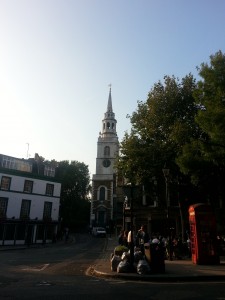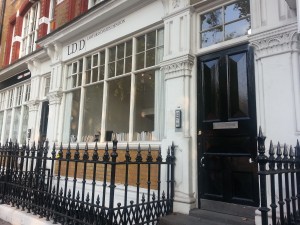Just a few minutes before the bell tower of St James’ Church opposite our office strikes 5, I suddenly realize one week has already gone by and it is time for a blog post.

I entered this office Monday, not even one week ago, but I already feel I have found my space here. When I knocked on the black door of 14 Clerkenwell Green I was carrying a backpack and dragging a 18kg suitcase with all my stuff for the coming 4 weeks.
The moment I got off the last bus and walked towards the office of Sense about Science, the charity where I will do my internship, all the thoughts and expectations I had about this new experience suddenly came back to me and evaporated in a few seconds, replaced by an excited feeling of curiosity.

How did I end up here?
Some months ago I bumped across a blog post from one of the previous participants of the Charity Insights program at Imperial College and was intrigued by the idea of doing something outside academia but still somehow linked to my scientific background. Being a PhD student working in an external research institution (i.e.: not among the familiar walls of Imperial College) can be pretty hard at times. The feeling of loneliness we all experience at some point of our research is somehow emphasized by the simple fact that… you are alone! No other PhD fellow to vent with about the inconsistency of your results, the puzzling outcome of your reactions, the sometimes unpredictable behaviour of the machines you are using. Sometimes a chat with someone going through the same difficulties can help put things back in perspective. For this reason I tried to take advantage, while in London, of the activities offered by the Career Office, and participate to courses and workshops. Oh, just a little detail: I am not even based in the UK, the research institute where I work is in Belgium. Which happens to be a lovely country, but just adds to the list of difficulties one must think about when participating in activities organized by the College!
Why the Charity Insights program?
I simply thought it was a great idea. Testing your skills on a different environment, using the kind of approach developed in these years of study and research to do something else.
When I read about Sense about Science my interest just grew more and more: they seemed to be the concrete active form of vague idea I have been having in my mind for some time now. This charity wants science to be made accessible to a broad audience, and the public to be involved in the scientific debate. I found their approach really interesting because they encourage people to get involved, being active in asking and looking for information more than patronizing or lecturing them. The underlying idea is that there are specialists in the field (the scientists) who have the competence and the experience to evaluate scientific facts to a deeper level, but this does not imply that those who do not have this background have to step back and wait for the science to speak. They can themselves be proactive and actually need to be so. After all, we cannot be specialists in… everything. If anything, what doing research is teaching me is that the more we know about something the more we see how much there is still to investigate. This recognition of our limited knowledge doesn’t prevent us from being critical and inquisitive in what we read about science.
The second reason why I was interested in working with an organization involved on Science Communication is more personal. Countless times it happened to me to be asked weird questions about anything that sounded science-related from “why do I lose so much hair?” to “is [compound x] carcinogenic?” Sometimes it can be very difficult to disentangle true findings messed up with vague hypotheses and extravagant claims. I thought that seeing how this kind of discussions are tackled in a more “professional” way could give me some good hints for the heated discussions with my friends.
Furthermore, I firmly believe that as citizens we have the right and somehow the duty to get informed and speak up to let our voice heard. To make this voice meaningful, though, we need to know what we are talking about and to have a critical approach to things. I never thought of scientists as detached individuals closed in their laboratories, but rather as curious and creative people who want to understand how things work to make them work better. I think science needs to have a place in society, but making place for science is (also) up to scientists. Sense about Science seemed to me a good place to get an idea about how this can be done for real.
The first contact between me and SaS was via e-mail, followed by a skype call (with my connection being very unstable!) and e-mails between me and Victoria, my supervisor at Sense about Science and Amy, at the Career Office.
After a 40-minute delayed flight from Brussels, here I am, once again, in London, looking for an accommodation for these 4 weeks, pulling out of my purse my remaining pounds and my Oyster card. The first days have been quite tiring, settling in my minuscule room, learning once again my way to work, getting used once again to London and its charm. Surviving 5 days with no internet connection!
At the same time they have been great, I started working in a very friendly and stimulating environment, and I feel like I have already learned a lot. On my 50 minutes trip to work (thanks London!) I am every morning gathering ideas and thoughts, making a mental plan of what needs to be done at work, enjoying being where I am doing what I do.
As for what I exactly do, that is for the next post!